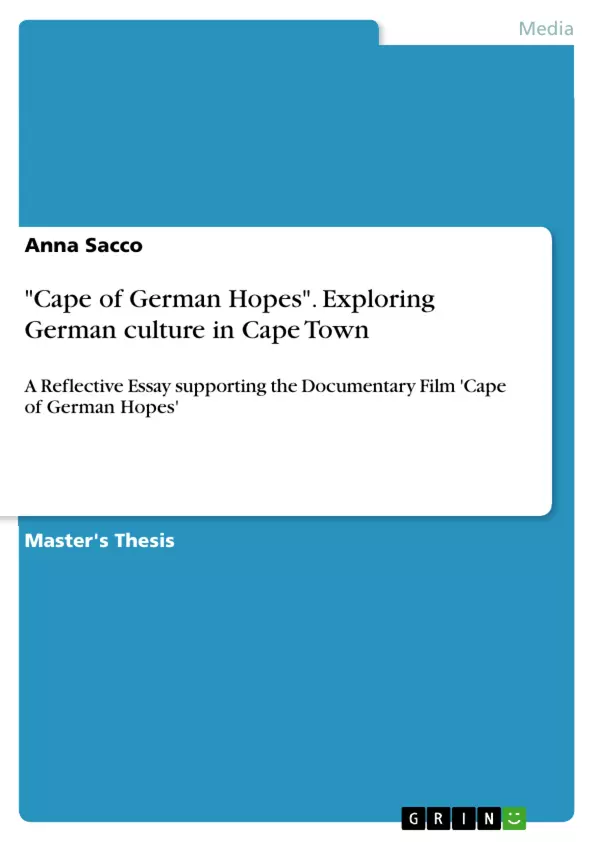Documentary film, in the words of Linda Williams, always has the receding goal of finding “some form of truth”. Yet documentary film as an art also blurs the notions of fact and fiction and runs the risk to construct reality rather than merely show it. This dissertation paper is a Reflective Essay supporting the documentary film 'Cape of German Hopes' and aims, with special references from the director's and editor's perspective, to back up the documentary by explaining more in depth about the motivation, goals and achievements of the film.
The documentary is a journey that explores life experiences of German families and people of German heritage who settled in Cape Town. It uncovers how they seek to find a balance between their cultural heritage and the culture they are living in. In selected scenes, the paper illustrates how the protagonists on the one hand open up to the South African culture, but on the other still manage to keep their typical 'Germanness'.
As migration increases around the world, the studies of its cultural consequences concern more and more people. Exploring cultural aspects of other social groups implies dealing with anthropological terms like identity, transnationalism and acculturation. But it is difficult to define, what shows itself only in full play. Consequently, the documentary film wants to serve not only the German community in Cape Town, but also function as a blueprint for other immigration groups living all over the world.
Inhaltsverzeichnis (Table of Contents)
- Introduction
- Theoretical Framework
- Transnationalism
- Identity
- Acculturation
- The Documentary Film 'Cape of German Hopes'
- The Making of the Documentary
- Preproduction Period
- Shooting Period
- Post-Production Period
- The Examination of the Documentary
- Problems and Limitations
- Promoting the Documentary
- The Making of the Documentary
- Conclusion
Zielsetzung und Themenschwerpunkte (Objectives and Key Themes)
This dissertation paper serves as a reflective essay supporting the documentary film "Cape of German Hopes". The essay aims to delve deeper into the film's motivation, goals, and achievements, drawing on the director's and editor's perspectives.
- Exploring the experiences of German families and individuals of German heritage who settled in Cape Town.
- Understanding how they navigate and balance their cultural heritage with the culture of their adopted home.
- Examining the dynamics of acculturation and identity formation within a transnational context.
- Highlighting the historical parallels and differences between Germany and South Africa.
- Using the documentary as a potential blueprint for understanding other immigration groups worldwide.
Zusammenfassung der Kapitel (Chapter Summaries)
Chapter two lays out a theoretical framework for the documentary. This includes a historical overview of documentary filmmaking, followed by an exploration of key concepts such as "transnationalism", "identity", and "acculturation".
Chapter three details the production of the documentary film "Cape of German Hopes". It covers the pre-production period, including the development of the idea, the shooting period, and the editing process during post-production. This chapter also includes a detailed analysis of key scenes in the documentary, interpreting the meaning and purpose of these scenes. It further examines the role of poetry and music as essential elements in the film's narrative storytelling.
Chapter three concludes with a reflection on the challenges and limitations encountered during the production process. It also offers a selection of ideas on how to promote the documentary.
Schlüsselwörter (Keywords)
The dissertation focuses on themes of identity, culture, heritage, acculturation, transnationalism, immigration, and documentary filmmaking. It examines the experiences of German families in Cape Town and explores the broader implications of cultural exchange in a globalized world.
Frequently Asked Questions
What is the central theme of the documentary 'Cape of German Hopes'?
The documentary explores the life experiences of German families in Cape Town, focusing on how they balance their cultural heritage with the South African culture they live in.
How is 'identity' defined in the context of this film?
Identity is examined through the lens of transnationalism and acculturation, showing how individuals maintain their 'Germanness' while integrating into a new society.
What role do music and poetry play in the documentary?
Music and poetry are used as essential narrative elements to interpret the emotional journey and cultural nuances of the protagonists.
What is the goal of the documentary according to the director?
Beyond serving the local German community, the film aims to function as a blueprint for understanding the experiences of other immigration groups worldwide.
What theoretical concepts are discussed in the reflective essay?
The essay covers concepts such as transnationalism, acculturation, and the anthropological definition of identity within the framework of documentary filmmaking.
- Quote paper
- Anna Sacco (Author), 2011, "Cape of German Hopes". Exploring German culture in Cape Town, Munich, GRIN Verlag, https://www.grin.com/document/274515



